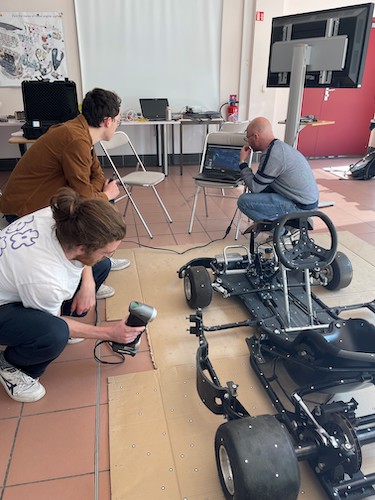Three students from the Energy and Powertrains (MOT) Specialized Engineering program, supported by IFPEN researchers, took on the challenge of converting a petrol-powered kart into a fully electric vehicle as part of their final-year project at IFP School.
Axel Bezard, Amaury China-Fort and Adrien Richard had just four months to complete this ambitious project—a tight deadline for any industrial prototype.
They applied their technical knowledge (mechanical systems, powertrains, electrical systems, IT) and soft skills (teamwork, adaptability, communication).
“The final-year project is a synthesis of everything the students have learned throughout the year,” explains Philippe Pierre, Supervisor of the MOT program
“Most of our student projects focus on simulation and modeling. This electric kart stands out for its applied, hands-on approach and tangible outcomes,” he adds.
Axel Bezard agrees: “What appealed to us was how complete and practical the project was. We had to conduct a technical pre-analysis, define the specifications and constraints, then implement the proposed solutions. We followed the full V-cycle.”
A Project Supported by IFPEN R&I
Close collaboration with IFPEN’s Research and Innovation teams is a key aspect of the School’s pedagogy. This project reflects that connection.
The goal: apply complex systems architecture principles—critical in vehicle and propulsion system development—to efficiently parallelize tasks and stay on schedule.
The students carried out the work in IFPEN’s research labs, with guidance from Ludovic Nowak (Engine Engineer) and Misa Milosavljevic, Project Manager at IFPEN’s Mobility & Systems Division and IFP School alum (class of 2011).
The kart was part of a broader demonstration project for IFPEN’s 48V powertrain, featuring a cutting-edge 35kW electric engine with inverter—only 10kg in total weight and highly compact.
IFPEN provided:
- A Sodi chassis,
- A 48V electric engine with integrated inverter,
- An ECU Master dashboard,
- A battery management system (BMS) with two 3.14 kWh lithium-ion batteries (from GCK Group).
“We were given the base chassis, motor and all components. IFPEN researchers trusted our integration and implementation capabilities and connected us with the right experts when we hit roadblocks,” explains Adrien Richard.
Electrifying a Petrol-Powered Kart
The team began by stripping the kart of all internal combustion components—engine, exhaust, fuel tank.
Using a laser scanner, they created a 3D model of the chassis to aid in redesign and fitting. They also ran energy simulations on a kart track using MATLAB.

They then installed the new electric components: two 25kg lithium-ion batteries, the engine, inverter, wiring and circuits.
With CAD tools, they designed custom parts to mount the new components and adapted the transmission to suit the electric powertrain.
The students installed and configured:
- The electric engine (following safety standards),
- The BMS and control system,
- All wiring using the CAN protocol.
“We had to manage technical constraints and electrical hazards—safety was a key aspect of the project,” notes Amaury China-Fort.
“Our goal was to produce a reliable, high-performance prototype suitable for commercial rental kart fleets,” he adds.
Currently, Axel, Amaury, and Adrien are putting the finishing touches to their electric kart.
“We’re really close—just one step away from having it safely up and running!” says Adrien enthusiastically.
Their final presentation will take place at the end of June before a jury of industry mentors and fellow students.
Article written by Meyling Siu Miranda